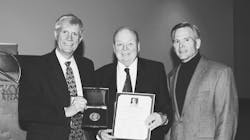Backgrounder: Honeywell's Don Bateman Named 2013 Recipient of Elmer A. Sperry Award For Advancing Flight Safety
PHOENIX, March 4, 2014 /PRNewswire/ -- Don Bateman, corporate fellow and chief engineer technologist for Flight Safety Systems and Technology at Honeywell Aerospace, has been recognized with the 2013 Elmer A. Sperry Award for Enhancing the Art of Transportation by developing life-saving technology that has eliminated accidents and saved thousands of lives.
The Elmer A. Sperry board recognized Bateman for his development of Honeywell's Ground Proximity Warning System (GPWS), a terrain awareness and warning system, which has been responsible for reducing Controlled Flight Into Terrain (CFIT) accident risk. Bateman and his team continued to develop GPWS, which evolved into Honeywell's Enhanced Ground Proximity Warning System (EGPWS) that has reduced CFIT accidents from about one in every 3 million flights to less than one in every 20 million flights. Bateman received the award on March 3, 2014, at the Institute of Electrical and Electronics Engineers Aerospace Conference in Big Sky, Montanna.
"Growing up, I learned the stories of Lawrence Sperry and his father, Elmer A. Sperry, whose genius changed aviation forever," Bateman said. "The Sperry message was simple to me: Elegant technology can grow into businesses small and large, and that motivated me to use my love of engineering and technology to advance aviation safety."
CFIT accidents happen when pilots who have aircraft in their control inadvertently fly into unseen terrain, such as a mountain or body of water. Motivated to eliminate these types of accidents, Bateman began his initial work on the technology that would become GPWS in the late 1960s. In 1974, the FAA mandated that all large jet aircraft have GPWS installed, and CFIT accidents have dramatically reduced since then.
"I was motivated to overcome the early challenges of developing GWPS by focusing on the notion of saving lives. This was the most important thing to me, and I think Elmer would be proud of that today," Bateman said.
Some of Bateman's proudest moments include receiving the first orders of GPWS from airlines such as Scandinavian Airlines and Pan Am, followed by the continued growth of the product into EGPWS and orders placed by customers including British Airways, United Airlines, American Airlines, Boeing and more. To date, Honeywell has installed EGPWS on more than 55,000 commercial and military transport aircraft, and those aircraft have flown for more than 15 years with almost no CFIT losses.
To this day, Bateman is still dedicated to improving safety for aircraft around the world. He and his team of engineers are looking at the next pieces of technology that will improve flight safety on runways, takeoff and landing, and reduce collisions on the ground.
About Don Bateman
During his 58-year career at Honeywell, Bateman has been instrumental in the development of word-class technology that has contributed to the evolution of aviation. He has more than 50 unique patents and 90 foreign patents for aviation safety technology.
Bateman was the recipient of Aviation Week & Space Technology's lifetime achievement award in 2013 for his work with EGPWS, received the U.S. National Medal of Technology from President Barack Obama in 2011, was inducted in the Museum of Flight as an Aviation Pathfinder in 2003, and was inducted into the National Inventors Hall of Fame™ in 2005. In 1997, Bateman was recognized with an Aviation Week Laurel for IT and Electronics. A graduate of Canada's University of Saskatchewan, he is also a Royal Aeronautical Society Fellow and a private pilot with an instrument rating.
About the Elmer A. Sperry Award
The Elmer A. Sperry Award was established in 1955 to commemorate the life of Elmer A. Sperry. The award is given in "recognition of a distinguished engineering contribution which, through application, proved in actual service, has advanced the art of transportation, whether by land, sea, air, or space" to stimulate innovation in many fields. The award's board is comprised of representatives from six professional societies: the American Institute of Aeronautics and Astronautics, the American Society of Civil Engineers, the American Society of Mechanical Engineers, the Institute of Electrical and Electronics Engineers, SAE International, and the Society of Naval Architects and Marine Engineers.
About Honeywell's Enhanced Ground Proximity Warning System
Honeywell's EGPWS serves as an independent monitor of an aircraft's position relative to surrounding terrain. With 30 years of ground proximity warning experience and more than 300 million departures of EGPWS-equipped aircraft, Honeywell offers the most advanced, cost-effective solution for CFIT incidents and aviation safety.
